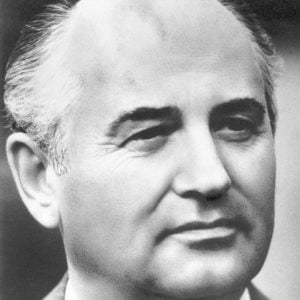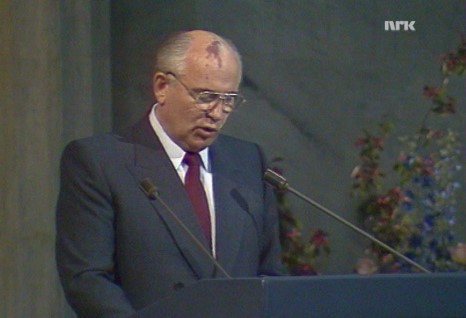Mikhail Gorbachev
Speed read
Mikhail Gorbachev was awarded the Nobel Peace Prize for his leading role in the radical changes that brought the Cold War to an end.

Full name: Mikhail Sergeyevich Gorbachev
Born: 2 March 1931, Privolnoye, USSR (now Russia)
Died: 30 August 2022, Moscow, Russia
Date awarded: 15 October 1990
From the Cold War to cooperation
The Cold War between East and West ended in 1989. According to the Norwegian Nobel Committee, this was largely the accomplishment of President of the Soviet Union Mikhail Gorbachev. After becoming leader in 1985, Gorbachev gradually began criticising the Soviet system as the country could neither keep up with the USA in the arms race nor provide its citizens with a decent standard of living. Gorbachev aspired to reform communism, introducing the terms “glasnost” (openness) and “perestroika” (restructuring). He promoted liberalisation and sought to ease tensions with the USA in order to divert funds from military to civilian aims. He announced that he would not prop up communist regimes that did not have the support of the people in other countries, thereby starting a chain reaction that led to the fall of communism in Europe.
| The Cold War Name of the conflict between the USA and Soviet Union, and their allies, between 1947 and 1989/90. Despite the animosity, the USA and Soviet Union avoided a direct “warm” war that could have resulted in a nuclear catastrophe. |
”The new-found openness and willingness to cooperate shown by the Soviet Union, and its readiness to accept realistic compromise, have created fresh hope under his leadership.”
Chairman of the Norwegian Nobel Committee Gidske Anderson, Presentation Speech, 1990.
Gorbachev and Reagan
In 1979, the Soviet Union invaded Afghanistan, adding considerably to Cold War tensions between East and West. Ronald Reagan, elected president of the USA a year later, called the Soviet Union “an evil empire.” The arms race between the two countries escalated, and the world began to fear the outbreak of nuclear war. But when Gorbachev rose to power in 1985, he took the initiative for several summits between the two leaders. Gorbachev and Reagan shared a vision of a world free of nuclear weapons, and Gorbachev made it clear that he desired peaceful coexistence between East and West.
”Peace is movement towards globality and universality of civilization.”
Mikhail Gorbachev, Nobel Prize lecture, 5 June 1991.
Glasnost and perestroika
Gorbachev quickly gained popularity in the West for his reconciliatory foreign policy and his democratic reforms in the Soviet Union. Glasnost gave the Soviets greater freedom of expression and allowed them access to the foreign media. Perestroika gave the common man a voice to which Gorbachev listened in order to find ideas of how to restructure production to improve the Soviets’ standard of living. He also promised to withdraw Soviet troops from Afghanistan as the war was detrimental to the Soviet economy, community morale and relations with the West.
The collapse of the Berlin Wall
In 1988, the Soviets were given the opportunity to elect non-communists to the new Congress of People’s Deputies. Among those elected was 1975 peace laureate Andrei Sakharov. Gorbachev had allowed him to return to Moscow, from which he was exiled for criticising the Soviet system. In the spring of 1989, communist parties in Poland and Hungary lost in free elections. Gorbachev announced the end of an era in which the Soviet Union would intervene to support other countries’ communist leaders. On 9 November 1989, people began tearing down the wall separating East and West Berlin, initiating the fall of communist regimes throughout Europe.
Protests against Gorbachev’s peace prize
People in Estonia, Latvia and Lithuania protested when Gorbachev received the Nobel Peace Prize in 1990. These countries accused Gorbachev of using force to prevent their secession from the Soviet Union. In 1991, Soviet troops killed Lithuanians in a battle over a television tower. In response, leading Norwegian politicians wished to bar Gorbachev from giving his deferred Nobel Prize lecture, and fund-raising was started for an alternative peace prize for the president of Lithuania. In vain, Gorbachev claimed that he had not given the order to use force. It took time for people to realise that he no longer had control in the Soviet Union.

”As the fervor for freedom last year leaped from Poland and Hungary to Czechoslovakia and East Germany, Mikhail Gorbachev stayed the hand of those who wanted to crush it. He thereby allowed Europe to be transformed, peacefully.”
New York Times, 16 October 1990.
Learn more
1931: March 2, born, Privolnoye, Krasnogvardeisky District, Stavropol territory in the North Caucasus, to a peasant family in a small village, his father an agricultural mechanic on a collective farm ...
Disclaimer: Every effort has been made by the publisher to credit organisations and individuals with regard to the supply of photographs. Please notify the publishers regarding corrections.
Nobel Prizes and laureates
Six prizes were awarded for achievements that have conferred the greatest benefit to humankind. The 12 laureates' work and discoveries range from proteins' structures and machine learning to fighting for a world free of nuclear weapons.
See them all presented here.
